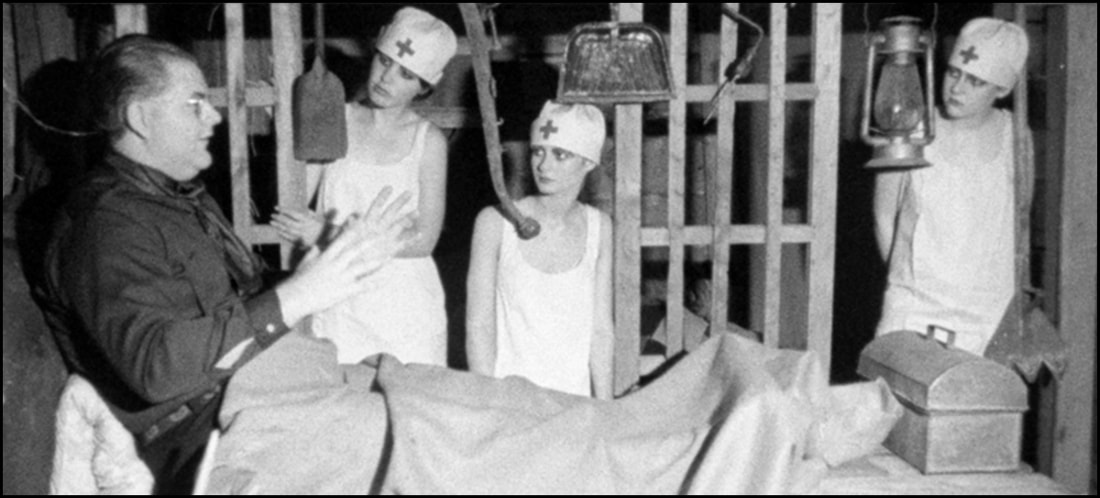Now, I’m an adult, see, so I can ignore the usual insults as well as anyone else can. It was clear that the fellow took issue with what I’d written about his little project, and I can understand anyone trying to debate with me the strengths and negatives of any flick. But this guy? He went a bit overboard, demanding that I return the film to the distributor (who had kindly shared a copy) and insisted that I take down my review from everywhere it had posted on the Information Superhighway. (This was back in the day when I was posting stuff on Amazon.com along with a few other sites.) So I responded to him politely and professionally, telling him that part and parcel of being a storyteller is being capable of understanding that not every audience is going to rave about your work, and yet this words were just not enough. Because I didn’t get his vision, I needed to essentially remove myself from his reality, to which I ultimately told him to both ‘grow up’ and ‘get lost.’
Having reviewed an incredible number of independent films, I can assure you that I don’t get every feature I’m provided or seek out of my own accord. My explanation is simple – I’m just as infallible as the next person, and I only speak to that which I do grasp in the narrative – and I think it’s the storyteller’s job – if he/she/they/it want to be successful in his/her/their/its own terms – to produce something that makes sense. It needn’t have universal appeal if that isn’t what the maker desires. If it doesn’t resonate – or if folks say they failed to comprehend the central point – then that doesn’t mean a failure (other than a failure to connect in this singular instance) … but you don’t go criticizing each person who watched it.
Instead, you kept telling stories. Ignore the critics. Judges be damned.
But don’t hate those who may not share in your vision.
That’s petty.
(NOTE: The following review will contain minor spoilers necessary solely for the discussion of plot and/or characters. If you’re the type of reader who prefers a review entirely spoiler-free, then I’d encourage you to skip down to the last few paragraphs for the final assessment. If, however, you’re accepting of a few modest hints at ‘things to come,’ then read on …)
From the film’s IMDB.com page citation:
“While their mother is dying in the modern Gimli, Manitoba hospital, two young children are told a tale by their Icelandic grandmother about Einar the Lonely, his friend Gunnar, and the angelic Snjofridur in a Gimli of old.”
The dirty little secret of art criticism – whether folks admit it or not – is that not every work is meant for every critic.
Stories are told for a variety of reasons, not the least of which is to necessarily be understood. Often times, storytellers wish to impart some measure of wisdom surrounding some central concept or idea; and in that risky endeavor some parts and pieces may inevitably be ‘lost in translation,’ as they say. Meatier ideas might require more time to ingest – deep stories often require a second or third exposure to be truly appreciated – and even a film like 1941’s Citizen Kane wasn’t exactly revered so much in its day as it earned its exalted place in art history decades after first being unleashed on audiences. Such is life, and such may be the case with Guy Maddin’s Tales From The Gimli Hospital.
Where I struggle with Gimli, however, is what to make of it all.
Cult films – of which Gimli most deservedly is – get embraced by audiences for any number of reasons. Sometimes, a director’s style pulls viewers in. Other times, it’s a mash-up of multiple genres that pits critics at odds over trying to say which category the tale owes most of its impact to. Maddin’s yarn never quite becomes anything specific to me – Drama? Tragedy? Comedy? – and, thus, I’m at a loss to have anything substantial to offer in reflection. Some sequences come across as pure fantasy while others have the undercurrent of satire; without knowing what’s actively being satirized, however, the impact never scores. A scene or two late in the picture are pretty close copied frames from Fritz Lang’s M (1931), the screen’s first real exploration of psychosis, but I’m lost as to know why. (In fact, Hospital’s opening and closing sequences are structurally very similar to what Orson Welles accomplished in the aforementioned Kane’s opening and closing sequences, but I couldn’t tell you why Maddin copied them here. Is it flattery or was it unintentional?) Are these patients mad … or are they merely rapturous with dark thoughts? There are hints – some obvious, and some a bit of a stretch – but it’s far too vague for this regular Joe’s gray matter.
Tales From The Gimli Hospital (1988) was produced by Extra Large Productions, The Canada Manitoba Cultural Industries Development Office (CIDO), and Winnipeg Film Group. DVD distribution (for this particular release) is being coordinated by the good people at Kino Lorber. As for the technical specifications? The product packaging boasts that this is a brand-new 4K remastering, and – while I’m no trained video expert – I thought the sights and sounds were very, very good. (As black-and-white photography goes, Gimli does look fabulous in a good deal of its running time.) Lastly, if you’re looking for special features? The disc includes a new audio commentary from Maddin, a trailer of the project’s re-release, and an accompanying short film (“The Heart Of the World”) also from the storyteller.
Mildly recommended.
Sorry, folks, but I’m not afraid to say that Tales From The Gimli Hospital leaves me a bit perplexed. While occasionally interesting, it’s still a bit long at 64 minutes, a great deal of it evolving over sequences a bit long and feeling far too experimental for me to grasp its import. Sometimes a tale is just a tale; but given the amount of critical extrapolation written about the flick I expected to be a bit more challenged. While its visually enticing, an awful lot of it just seems like it’s weird for weird’s sake. This, too, shall pass.
In the interests of fairness, I’m pleased to disclose that the fine folks at Kino Lorber provided me with a Blu-ray copy of Tales From The Gimli Hospital by request for the expressed purposes of completing this view. Their contribution to me in no way, shape, or form influenced my opinion of it.
-- EZ



 RSS Feed
RSS Feed